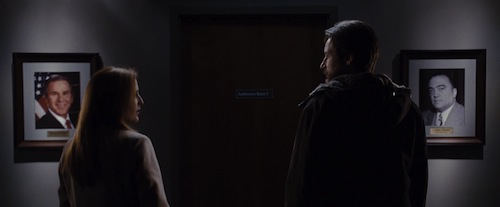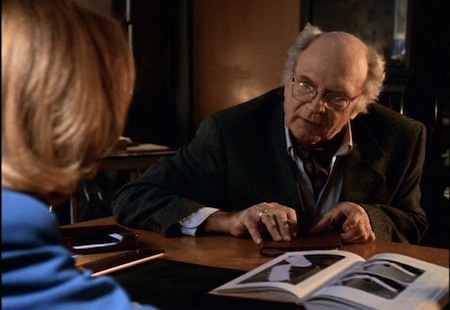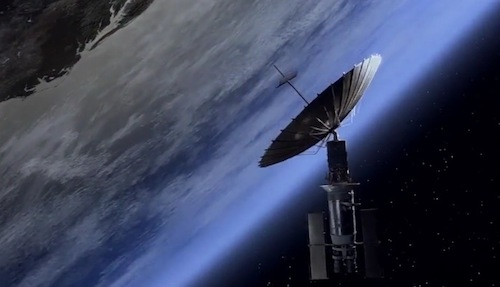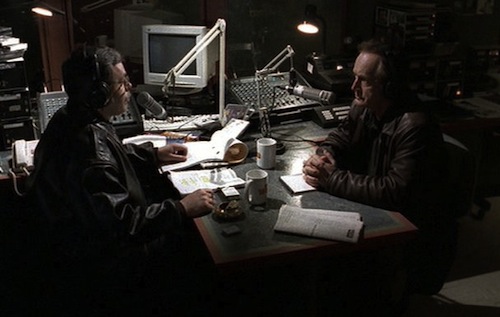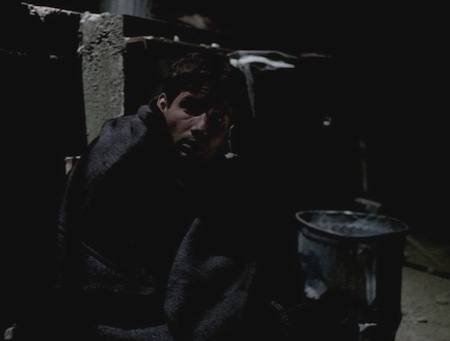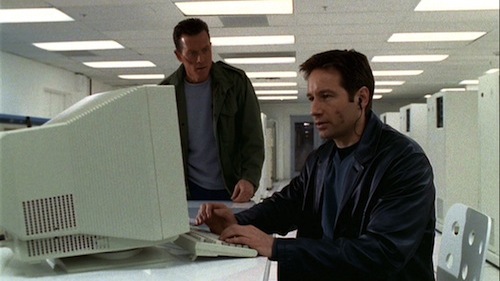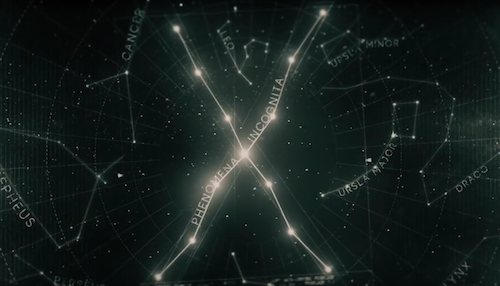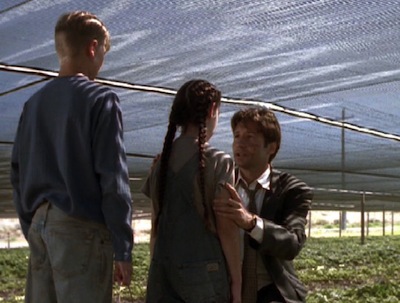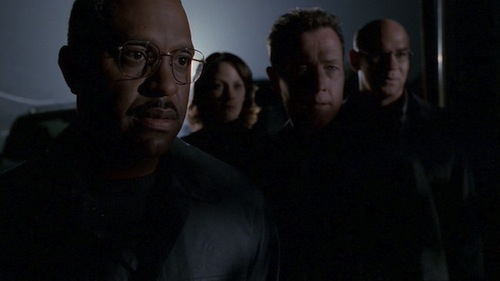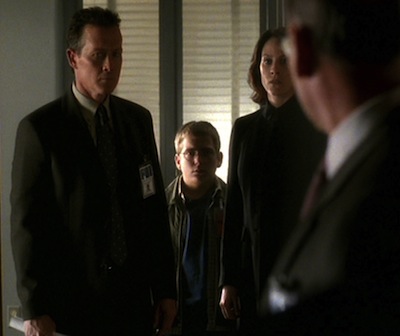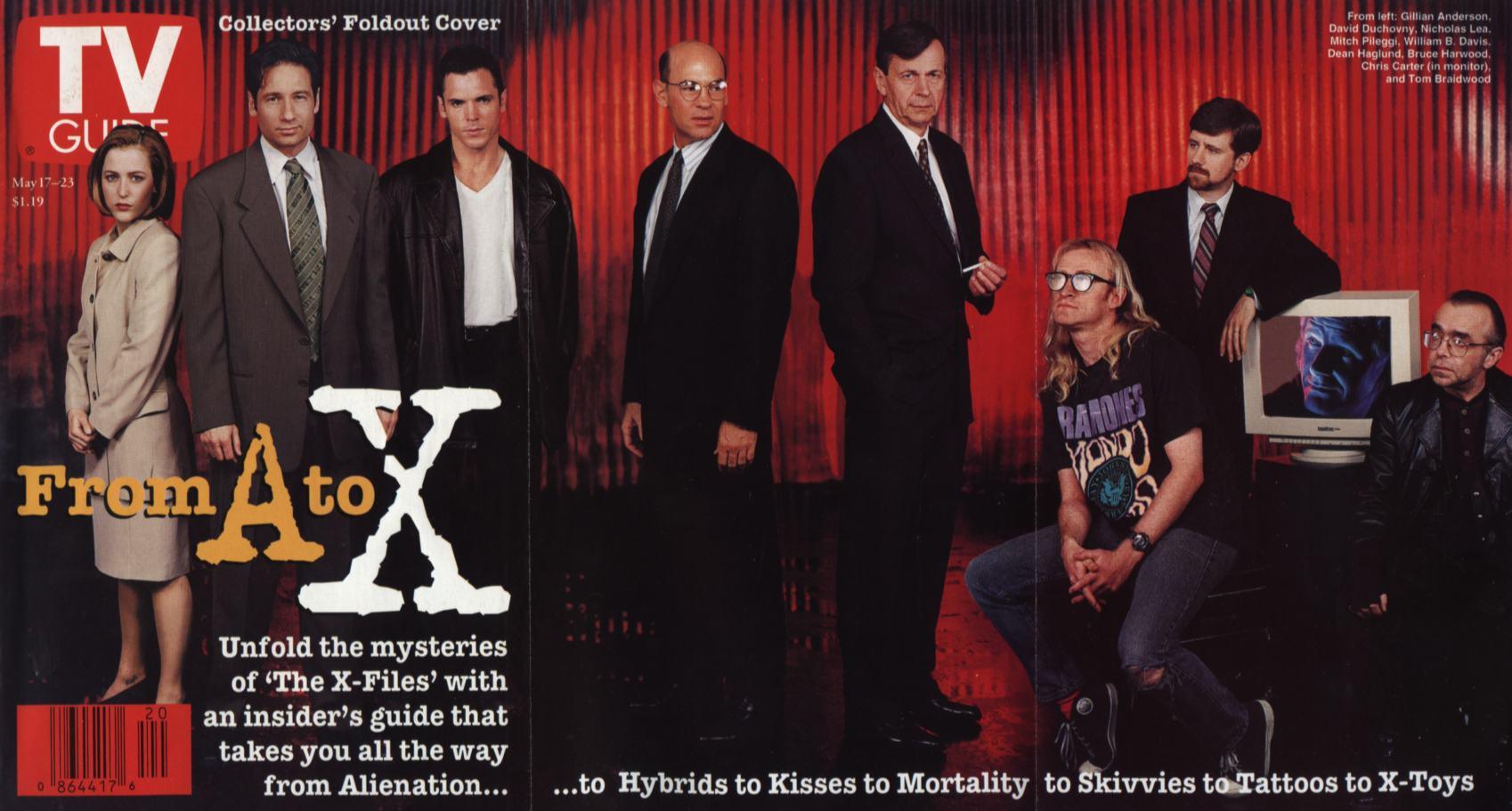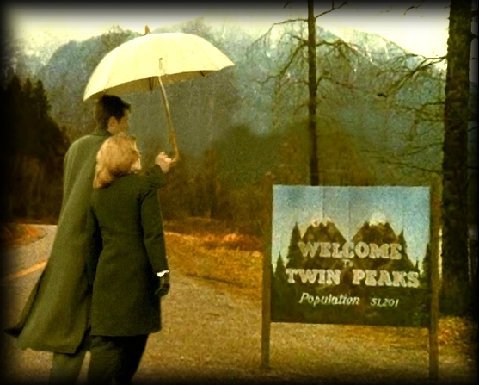We continue our examination of The X-Files and its future. After looking at what was left unsaid in Part 1, we look here at how the world has changed since the show left the air and what things it could possibly integrate in its universe.
Disclaimer: Though I do a lot of name-dropping, the topics here are in keeping with the themes of The X-Files and I do not necessarily agree with everything. Also, there is a US bias in many of the topics addressed; as much as I would like it to be more varied, The X-Files is an American show mainly addressed to an American audience and I tried to keep that in mind when thinking about what it could tackle.
Part 2: What new can it add?
The X-Files is remembered mostly as a thing of the 1990s: its best years were in 1994-1998; Skinner is remembered with a portrait of Bill Clinton in his office; its last season suffered from a “mood change in the country” according to Carter after 9/11/2001; it was absent from the screens during G.W. Bush’s presidency, so much so that this was a joke in I Want To Believe. But it was something of the 1990s in more ways than just how Scully’s wardrobe has aged or how grainy and 4:3 the picture is. The X-Files was, among other things, about that short part of history between the end of the Cold War and the start of the War on Terror (so many wars!), and the state of the American consciousness, and as an extension of the world as a whole, because of that. About how after being worried about the Soviets as aliens, we had to fill the gap with something in our minds and turned to the skies and extraterrestrials as aliens (“Tonight we have a new enemy“, as Deep Throat said). About discovering that not everything as it seems and that despite unprecedented economic growth and material well-being there are still many things we do not understand and many things we should not take for granted — hence the horror found in mundane settings and the paranoia around the government. Also about the new supplanting the old — with stories about secrets in small towns of rural America unraveled by DC investigators, or about finding faith in a world so shaken by globalization and new trends that the values of old no longer hold.
What new interesting developments has the world seen since 2002 that could be integrated in the world of the X-Files, and in particular of the X-Files mythology? Where can the new X-Files break new ground with all this?
Television and narration
Since the nineties, television has followed history and illustrated the obsessions of its time. Just to name a few: “24” was a signature show of the years when terrorists were in everyone’s minds; “Battlestar Galactica” allegorized the post-9/11 world with themes such as power abuse, the risk of totalitarianism in times of great stress, and “one man’s terrorist is another’s freedom fighter”; “Lost” made the interconnectivity of the internet age into a storytelling procedure, networking time periods, characters, storylines; “Breaking Bad” succeeded in marrying the novelistic single story arc vision with cinematic directing and photography; “True Detective” and “American Horror Story” have made the season-length anthology series format popular; and this year’s “sense8” is globalization incarnate, seamlessly transitioning between mindsets living all over this planet.
Now, everyone expects a show to have a well-structured mythology — audience and reviewers are not forgiving about this. Along with shows like “Babylon 5”, The X-Files pioneered the grand mythology type of storytelling and despite its undeserved reputation it excelled at making it interesting and coherent — this very site exists to make that point! Whether they made it along as they went or not (which they did, at least for the specifics of each scenario) is not relevant, what is important is to have a throughline to patch each individual scenario to, and there’s no reason why Carter couldn’t still fulfill that role. If there are things to worry about Carter’s handling of things, it wouldn’t be this.
The mythology approach for genre shows has become so common that the anthology type of show, with a series of stand-alone stories, or even a show like the X-Files that alternated between stand-alone and mythology episodes, has essentially disappeared. Narration is much more serialized over several episodes. Actually, given the X-Files’ schizophrenic treatment of its characters between the earth-shattering personal events of mythology episodes and the reset-button monster-of-the week, adding some continuity and fluidity would not be a bad thing! The X-Files was famous for its self-contained stand-alone episodes that could offer wildly different types of stories and make the voices of individual writers stand out compared to a uniform single-voice serialized show. This differentiating richness must be kept and it won’t be considered old school if it keeps its format of alternating mythology and stand-alones; however its approach and transitions must be reexamined.
In addition, the post-modern narration that the X-Files experimented with in some of its episodes (3X20: Jose Chung’s “From Outer Space”, 5X06: Post-Modern Prometheus) has become something more common, and massively popular. Intertextuality within a television show or even between genres is much more accepted (anything by Charlie Kaufman, anything by Quentin Tarantino, “Community”) — we live in a Darin Morgan world! Whereas most of the X-Files’ (Carter’s) candid idealism has become less frequent or less popular: anti-heroes or tortured individuals, not romantic heroes, populate our screens. Again, here, The X-Files’ plurality of voices with several writers expressing themselves is something Carter has understood as an important part of the success of the original show.
Going full Orwellian
In terms of changes in the real world since the 1990s, the obvious item is the surveillance state. Carter has attributed the loss of steam of the show in season 9 to the fact that the X-Files’ mistrust of government would catch difficultly with the public opinion. After a decade with “patriotism” the key word, mistrust of Big Government is back in the public consciousness. The revelation of a global surveillance program in various incarnations, what many people have been saying was happening all along, has shaken the media since 2013. The NSA surveillance programs PRISM, the NSA big data analysis program Boundless Informant, the deals between US-UK governments and large private companies to have access to all telecommunications, the spying of various governments by the US government, the leak of intelligence cables to the press, surveillance by drones and drones warfare, this is all material The Thinker and Fox Mulder would rave about! The X-Files touched on surveillance several times, with the most notable example in the show’s last season, 9X08: Trust No 1, with NSA cameras recording absolutely anything.
There are always fringe groups, like the 9/11 “truthers”, but, ironically, such concerns are much more mainstream now compared to how conspiracy theorists were when Mulder was called “Spooky”, which breathes more realism to the X-Files. The “New World Order” aspect of these developments is very close to the X-Files’ obsessions for a cabal of private interests working secretly against the interests of the many, and I can’t imagine a new X-Files without some of this being mixed to the Syndicate/alien conspiracy.
“Welcome to the wonderful world of high technology”
Related to the above: as surveillance programs have developed and embraced high-tech, so have those who try to counter them. Wikileaks, Julian Assange, Edward Snowden, Bradford/Chelsea Manning, anonymizer Tor, the Dark Web, peer-to-peer networks used to spread information and render censorship impossible: all these items are what mainstream media and conspiracy theorists both talk about. A Lone Gunman type of character informant to Mulder and Scully would be well versed in all this.
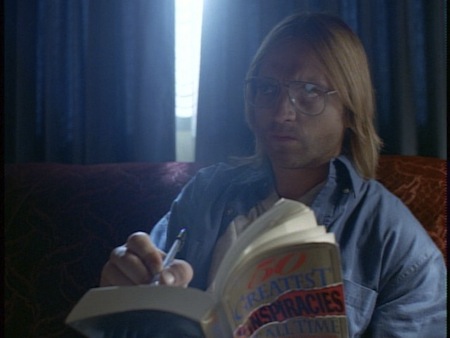
“The Thinker”, the fourth Lone Gunman (from 2X25: Anasazi)
Internet and the media
The internet and social media has changed the speed with which information is received and spread, making it easier for anyone to track the source and understand if information is manipulated or not. This apparent democratization of information has been twisted into manipulation, with “planted” stories or stories that subjectively present selected parts of a whole that become viral; conspiracy stories there are easy to imagine. Social media can be deceptive, as one only chooses to be informed by media outlets one agrees with ideologically beforehand, thus missing the counterpoint. Mass media oftentimes eschews information neutrality, either unawares or purposefully, and become tools with an agenda to protect — particularly deceitful when they pretend impartiality. This bias has particularly been debated around — ironically, for The X-Files — FOX News, with accusation of conservative views; other channels have been accused of having a liberal bias. Recent decades have also seen a resurgence of talk radio, which is often fertile ground for clearly one-sided politically oriented discussion, due to the 1987 repeal of the “fairness doctrine” that required public broadcasters to present balanced views of a controversial issue.
Chris Carter is certainly sensible to these issues. His project for a TV series around “Area 51” (discussed on Eat The Corn here) would have included some discussion on “the spectrum of political discourse as seen on the cable news channels” and would be “treading on some of this interesting ground that Bradley Manning, Edward Snowden, and Julian Assange have uncovered for us“, surely addressing topics like media manipulation of information and the hiding of governmental/military secrets. Carter himself had appeared on the popular but underground radio talk show “Coast to Coast AM” by Art Bell, a staple of conspiracy/paranormal talk shows since the 1980s; he went so far as to have Art Bell himself appear on the Millennium season 3 episode “Collateral Damage” to welcome Frank Black in his studio.
The media and information ultimately join the central themes of The X-Files: it is about the truth, whether it can be hidden, whether there is an “absolute” truth. If Carter was following these trends from the 1990s and earlier, he surely has things to say about them, and now that “Area 51” has been cancelled he can recycle these storylines into the X-Files.
El mundo gira y gira
Compared to the nineties, today’s world is certainly much more complex. The fall of the Soviet union did not bring about the end of history; today we live in a multi-polar world where the power of the United States is not what it used to be, if not waning, where geopolitics are fluid and where terrorist attacks somewhere in the world are part of everyday news. When right-wing militia and apocalyptic cults were more of a thing of the nineties, today worries are more about random spree killings and popular discontent due to racial discrimination or racially motivated killings. The never-ending economic “crisis” has become the new normal; the impoverishment of the middle class has generated discontent and movements like Occupy and the 99%, and while some are more wary of one another some others have become more active in civil society. The X-Files could find ways to illustrate these unstable times in allegorical ways, like the recent trend with zombies could be seen as an allegory for the uniformization of modern society and the brainwashing of clerical jobs (XF had been there with 5X19: Folie à Deux).
The demographics are changing as well, with “minorities” and multiracial people increasing and being represented in the media more. The adage of the power only being held by old white males that the X-Files used for the Syndicate no longer holds. Certain episodes purely based on exotic foreign cultures, like 3X19: Hell Money or 4X04: Teliko, won’t do. The X-Files was a series written by (nearly exclusively) white males with a (nearly exhaustively) all-white, heterosexual cast. Some variety in the cast and some more international scope in the stories would be a natural evolution.
“Science is their religion”
The X-Files thrived on the divide — and intersection — of science and religious belief, and while scientific research has broken new ground since the 1990s, society as a whole is little more advanced when it comes to its spiritual anxieties and each person’s need to feel part of a greater whole. Quite the contrary, recent times have also seen the emergence of more fundamentalist religious groups and skepticism towards science, with movements of anti-science, anti-vaccination, climate change denialists, evolution theory skeptics and proponents of “intelligent design”.
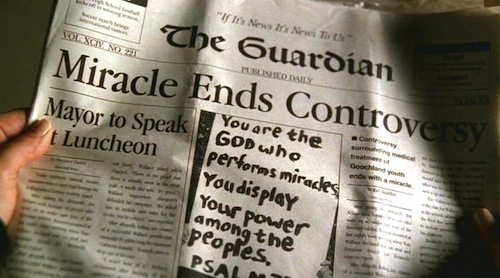
7X15 En Ami: A miracle redeems believers — but the miracle was man-made
Building a story around these trends is much trickier — and risky! The X-Files universe was often more black-and-white than grey; despite “humanizing” the villains and making tragedies out of their stories, the good side and evil side were easily recognizable in the X-Files (and Millennium), particularly in spiritual episodes. It would be interesting to see what the X-Files would make out of this.
“One day, the modern world would find us and my home town would change forever”
Can paranormal phenomena remain unproven and urban legends really be taken seriously today, when everyone has photo cameras? Can secrets be kept and proof remain hidden when everyone has access to wifi with a smartphone? Can whole communities keep horrible secrets from the rest of the world? Can episodes like 2X24: Our Town or 4X03: Home take place today?
The ubiquitousness of the internet poses serious storytelling challenges to writers of mystery and horror, and one has to find new and believable ways to tell scary stories. Many modern films and series have compensated this with more horror, more explicit gore, more of everything — while the X-Files’ approach was to manage to scare with less; again this poses a challenge.
Similarly, investigating is not what it used to be, and I can imagine that much of what was time-consuming is now something “you can easily do on the Internet” like an accountant FBI fellow told Mulder in 7X22: Requiem. Investigative work in the 1990s was appropriately visual: sifting through a room full of (paper!) archives, looking at microfilms, rewinding through tapes… Now it would be more challenging to write about an investigation without falling victim to the unrealistic shortcuts and artificial impressiveness of series the X-Files itself inspired, like CSI.
Hell, The X-Files cannot be about everything! There are some things that the new X-Files will jive with, engulf in its world and twist them into its timeless themes, and others that will not fit.
We wrap up this series of article with Part 3 on where the series could go
